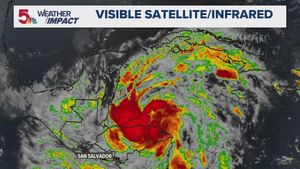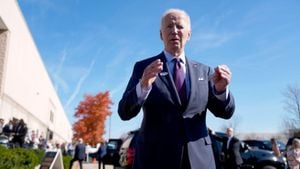Robert F. Kennedy Jr.'s recent nomination by President-elect Donald Trump as the head of the Department of Health and Human Services (HHS) has sparked intense debate across political lines, highlighting significant concerns about public health and safety amid his controversial history. Kennedy, well-known for his anti-vaccine stance and promotion of various conspiracy theories, is not just stepping up to oversee health agencies; he could potentially shape the future of public health policy for millions of Americans.
Trump made the announcement on his Truth Social account, expressing enthusiasm about Kennedy’s appointment. He framed Kennedy as someone who would challenge the "industrial food complex" and disruptive pharmaceutical practices, aiming to restore truth and transparency to public health narratives. “For too long, Americans have been crushed by the industrial food complex and drug companies who have engaged in deception,” Trump stated, hinting at his broader agenda against what he perceives as misinformation within health agencies.
HHS is responsible for overseeing numerous integral public health institutions, including the Centers for Disease Control and Prevention (CDC), the National Institutes of Health (NIH), and the FDA, to name just a few. With approximately $116.8 billion in discretionary federal funds, the department’s impact is substantial, making Kennedy's nomination particularly concerning for those who believe his views may compromise established public health standards.
Critics of Kennedy's nomination argue he lacks credible scientific grounding. Indeed, his long history of vaccine skepticism raises eyebrows among health professionals. Despite admitting to having had some vaccinations, he has campaigned against vaccine safety, spread misinformation about their effects, and even suggested links to autism—a claim widely debunked by extensive research and expert consensus.
Soon after the announcement, statements criticizing Kennedy flooded social media. Washington State Senator Patty Murray expressed alarm over his nomination, stating, “There is no telling how far a fringe conspiracy theorist like RFK Jr. could set back America... Health care access, coverage, research, and public health are life or death issues for people.”
The backlash against Kennedy’s views is well documented. He has repeatedly claimed vaccines are harmful without scientific evidence, contributing to hesitancy during public health emergencies. His influence was particularly felt during the COVID-19 pandemic, where he encouraged skepticism toward vaccines based on unverified claims, weakening national efforts aimed at disease control. Reports indicate his actions may have led to numerous preventable illnesses and deaths.
Notably, Kennedy’s anti-vaccine advocacy is not merely isolated to his comments but includes direct involvement in vaccine skepticism campaigns. His organization, Children’s Health Defense, has been implicated in spreading harmful misinformation, including making claims about the relationship between vaccines and autism without scientific basis. Such narratives can lead to real, harmful consequences, as evident from the deadly 2019 measles outbreak linked directly to vaccine hesitancy influenced by advocates like Kennedy.
His controversial remarks do not end with vaccines; he has also engaged with other fringe theories. For example, banning drinking water fluoridation, which is considered safe and beneficial for dental health, is among his proposals. He has also attracted criticism for asserting baseless claims linking environmental chemicals with health issues such as gender dysphoria.
Some experts are particularly worried about Kennedy's past statements linking COVID-19 to targeted attacks against certain ethnic groups. His claims suggest COVID-19 was engineered to affect specific populations, ideas which have been condemned as both baseless and racially insensitive. When such beliefs circulate unchallenged, they can undermine trust not only in government agencies but also propagate harmful stereotypes.
Even within the Republican Party, reactions to Kennedy’s nomination are mixed. While some conservative figures, like Senator Rand Paul, have praised the choice, others express concern about his public health impact. Louisiana's Republican Senator Bill Cassidy noted he is interested to learn more about Kennedy but withheld outright support.
The Senate confirmation process could reveal significant divisions among senators as they weigh personal views against their party’s alignment with public health strategies. With Kennedy’s nomination being one of the most polarizing picks of the Trump administration, it promises to ignite fierce debates reflecting wider national tensions around health, science, and misinformation.
Polls indicate strong public concern about vaccine misinformation and conspiracies, which can severely hinder public health initiatives. Former Surgeon General Jerome Adams remarked on the possible consequences if Kennedy significantly influences Trump’s administration, saying, “It could erode people’s willingness to get up to date with recommended vaccines.”
Public health experts point out the danger of appointing someone like Kennedy to such power, as his stance directly contradicts modern public health consensus. Kennedy’s history serves as a potent reminder of the delicate balance between personal beliefs and public responsibility, especially for those tasked with overseeing health policies affecting tens of millions.
The stakes are high not only for the future administration but for American public health as well—an uphill battle looms for the Biden administration as it assesses and possibly counters the incoming health policies under Kennedy’s guidance. With advocacy groups mobilizing and public consciousness rising, Kennedy's potential policies as HHS Secretary could spark not only legislative processes but also influence cultural dialogues around vaccine safety and public health governance.
With his nomination, RFK Jr. signifies one of the most contentious issues facing contemporary health policy: the intersection of personal freedom, public health, and unregulated information dissemination. Whether or not he is confirmed, his appointment ignites urgent discussions on how to manage public trust amid rampant misinformation and what strategies will support the integrity of health information moving forward.



